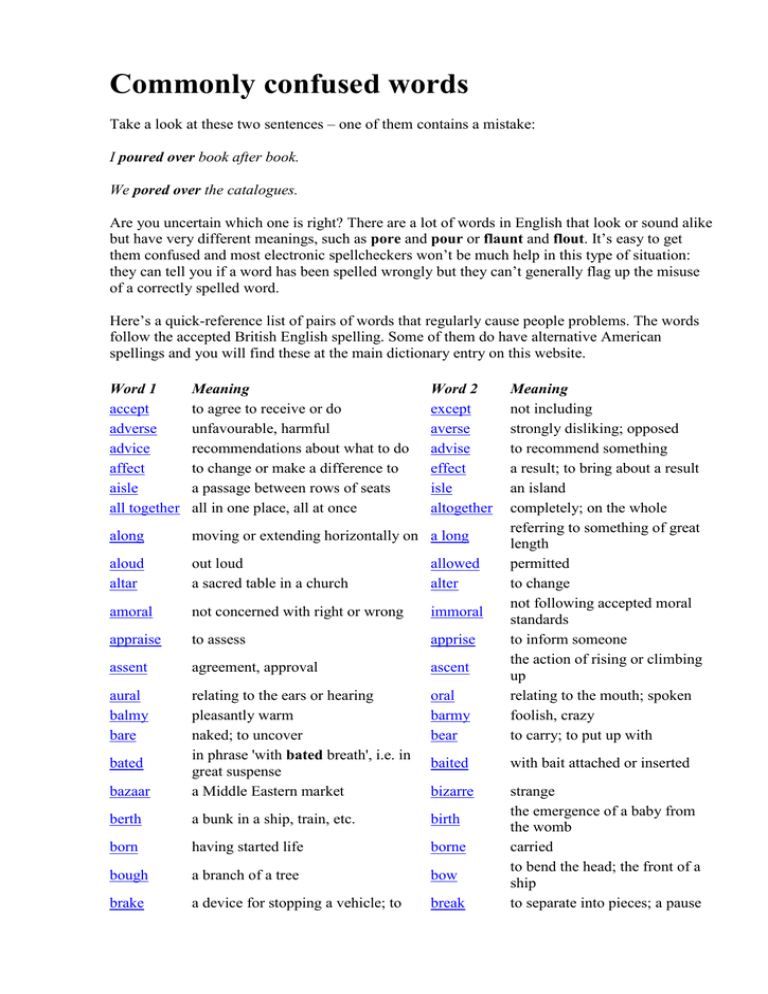
Commonly confused words
Confusing Words List 1. Accept: to receive (verb) - I accept your invite. Except: excluding (preposition) - I will invite everyone except him. 2. Advice: an opinion or a recommendation about what could or should be done (noun) - She never accepts my advice about her marriage.

Commonly Confused Words in English • 7ESL
This worksheet gives students the opportunity to practice using these two words correctly in a sentence! 4th through 6th Grades. View PDF. 2nd through 4th Grades. View PDF. View PDF. View PDF. These printable grammar worksheets will help students learn the differences between commonly confused words. (examples include: loose/lose, lay/lie.

1000 commonly confused words pdf Archives ilmist
Commonly Confused Words 1. Accept and Except 2. Advice and Advise 3. Affect and Effect 4. Choose and Chose 5. It's and Its 6. Lead and Led 7. Loose and Lose 8. Past and Passed 9. Personal and Personnel 10. Principal and Principle 11. Quite and Quiet 12. Then and Than 13. There, Their, and They're 14. Through and Threw 15. To, Two, and Too.

Commonly Confused Words Azlyn Richards
Most commonly confused words are homonyms— words that are similar in sound, but different in their meaning and spelling. A dictionary is the best way to make sure you are using the correct word. Keep in mind that this list is not exhaustive; there are multiple meanings for some of these words. Accept (verb) - to agree to receive or do

30 Commonly Confused Words in English for ESL Learners English Study Online
Commonly Confused Words Blinn College - Bryan Writing Center Spring 2023 Commonly Confused Words and Helpful Mnemonics The Prime Directive: When in doubt, pull the dictionary out. accept/except — Accept means to approve, to admit, or to receive. Except means to leave out or X out. affect/effect — Affect is the action which causes a change.
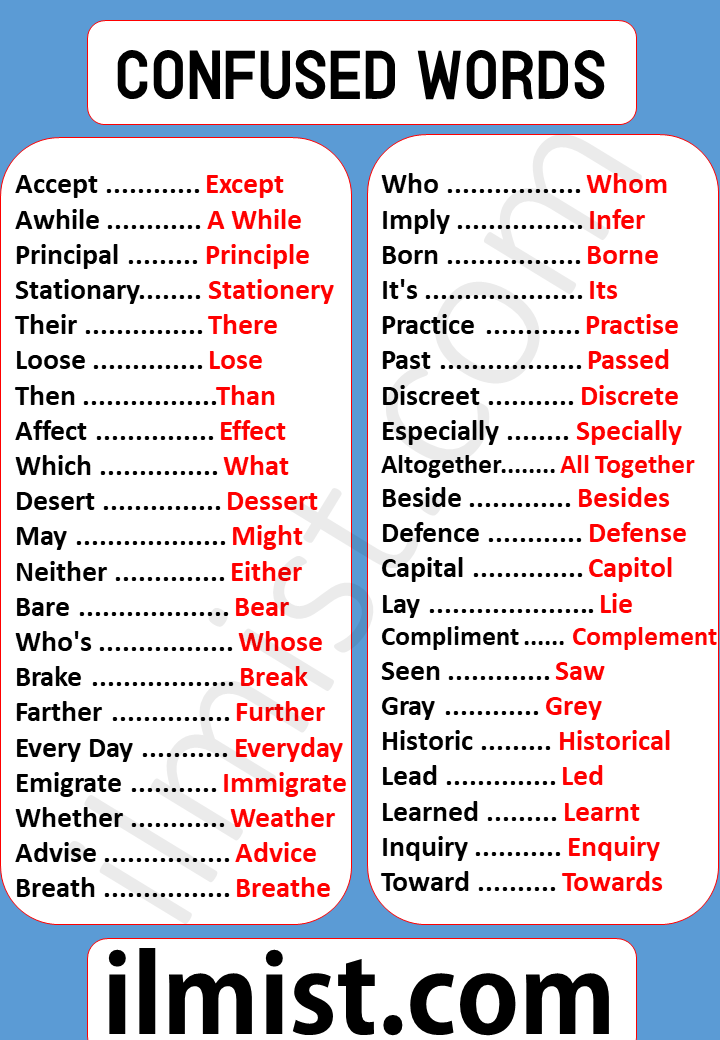
Most Commonly Confused Words in English English Vocabulary ilmist
1000 Commonly Confused Words pdf In this post, I am sharing with you the first part of 1000 Commonly Confused Words pdf. Here are some pairs of verbs that are often confused, along with their detailed explanations in English and Hindi. These verb pairs can often lead to confusion due to their similar spellings or meanings.
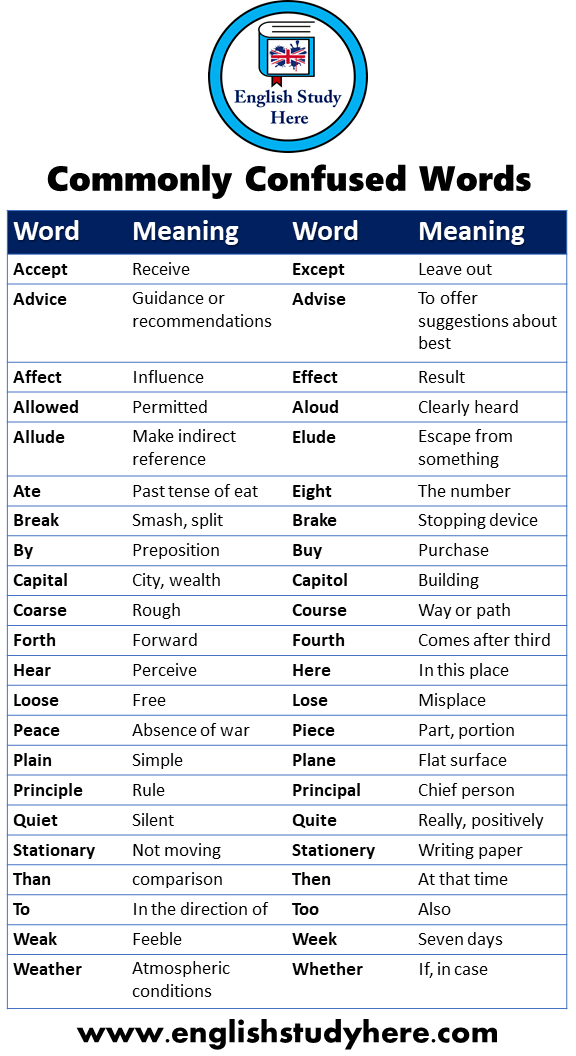
+35 Commonly Confused Words and Meanings English Study Here
Commonly Confused Words Then vs. Than Then refers to time. It was then that she realized she needed to eat. Than, however, is used as a comparison. It's commonly seen with the words fewer, less, and more. He has less hair than his sister. They're, There and Their They're is a contraction for "they are." They're looking for you.
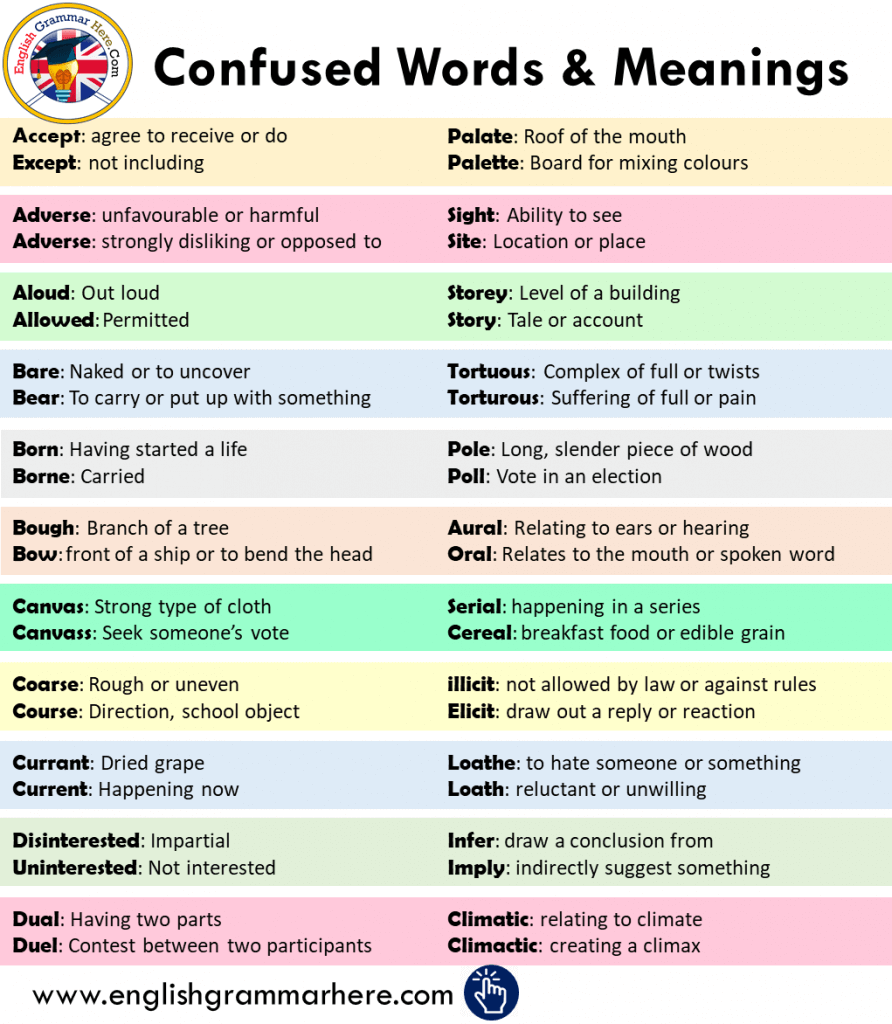
48 Commonly Confused Words and Meanings in English English Grammar Here
access vs. excess Access is used as a noun referring to the ability to enter, as in "access to the building," and as a verb meaning "to enter," as in "access the stage from the rear." Excess functions as a noun or adjective that typically has to do with an amount that is more than usual or necessary, as in "an excess of salt" and "excess baggage."

50+ Commonly Confused Words with Meanings
Commonly Confused Words affect / effect - In most cases affect is a verb, while effect is a noun. The tsunami affected the city. The effects of the tsunami are damaged buildings and injured people. You must do the assigned work for a class to affect you. If you do the work, then the class will have an effect on you.
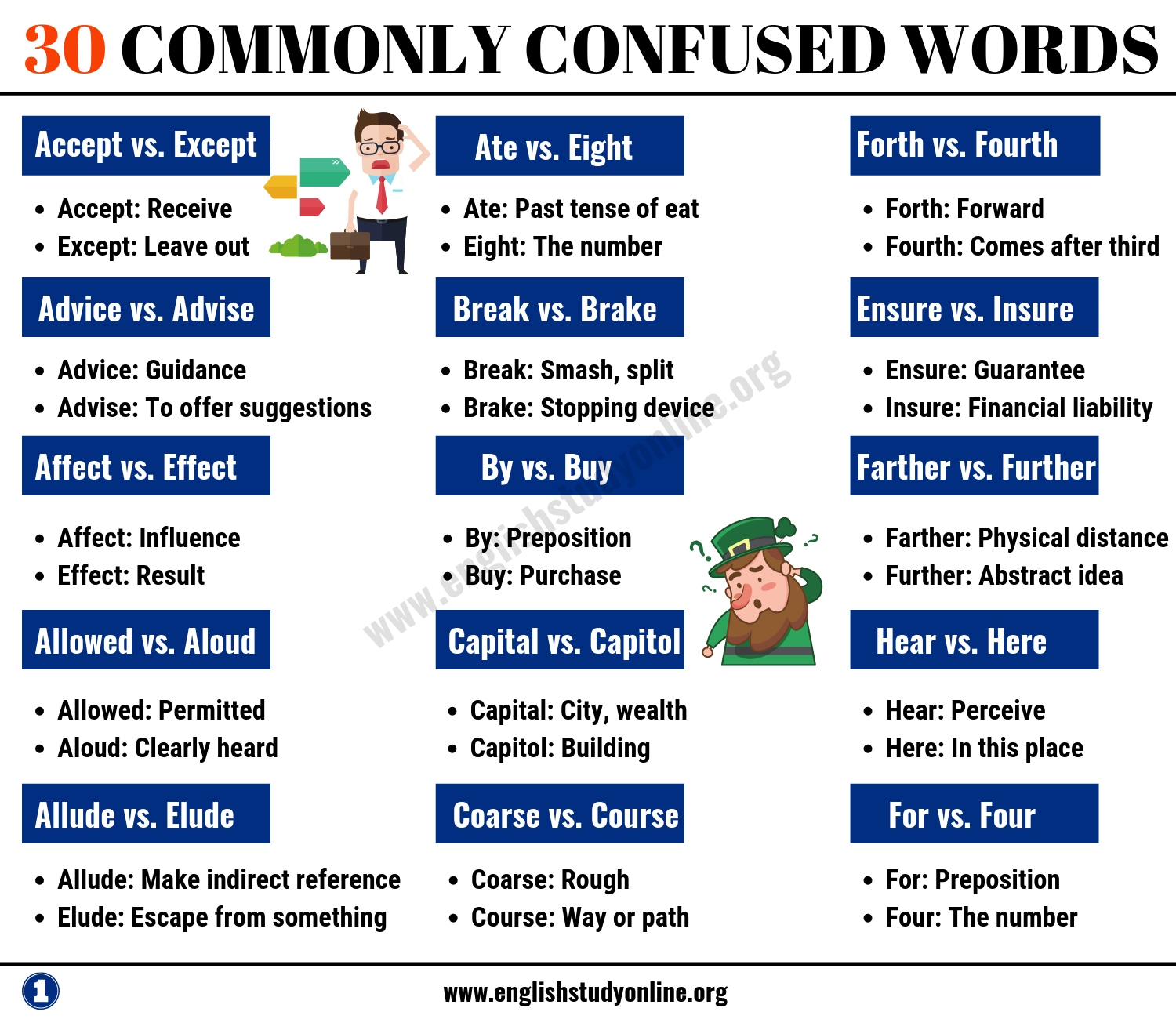
Commonly Confused Words in English Grammar Rules and Examples ESLBUZZ
Confusing Words List. 1. Accept: to receive (verb) - I accept your invite. Excluding: excluding (preposition) - I will summon everyone except him.. 2. Advice: somebody opinion or a recommendation about about could alternatively should be done (noun) - She never accepts my advice about her marriage. Consultations: to recommend, suggestion, or counsel (verb) - He advised me to stop smoking.

Commonly Confused Words and Meanings in English English Verbs, Learn English Grammar, English
Commonly Confused Words This handout addresses commonly confused and misused words. • and Except: Accept is a verb that means to receive. Except is both a preposition and a verb: meaning but and to leave out. Example: "He accepted a present" is different from "Everyone except Laurie received presents." • and Advise:
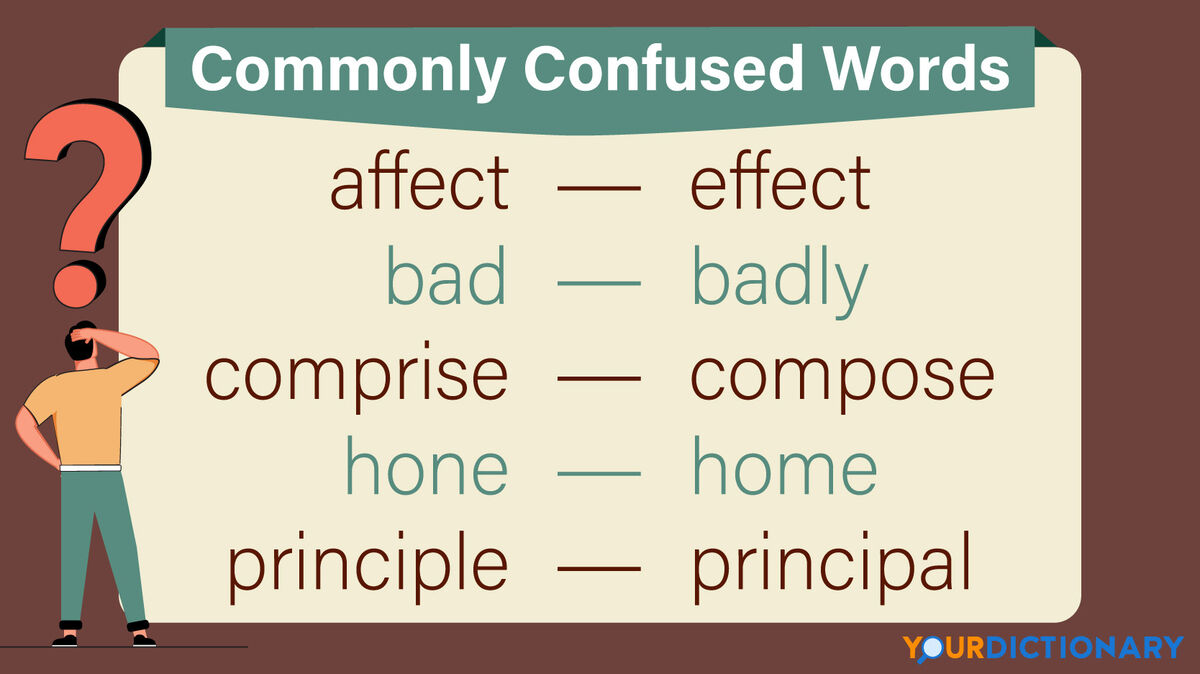
Commonly Confused Words (and How to Conquer Them) YourDictionary
affect / effect Effect is usually a noun that means a result or the power to produce a result: "The sound of the falling rain had a calming effect, nearly putting me to sleep.". Affect is usually a verb that means to have an influence on: "His loud humming was affecting my ability to concentrate.". Note that effect can also be.

Commonly Confused Words PDF
Commonly Confused Words 1. Allusion vs. Illusion An allusion refers to implying or referring to something, especially in literature. Ex. The horse mentioned in the text is clearly an allusion to the Trojan horse. An illusion refers to a misleading image, object, or idea that does not exist as it appears. Ex. The magician created the illusion of a disappearing coin.

Commonly Confused Words and Meanings English Verbs, English Vocabulary Words, English Grammar
Commonly Confused Words (Multiple-Choice Writing Section) Accept - Verb, Receive Except - Excluding Access - Verb, Gain entrance to; Noun, The right to enter or approach Excess - Noun, Adjective, Too much Advice - Noun, Recommendation, suggestion. Ex: My best friend usually gives very good advice.

Frequently Confused Words, Free PDF Download Learn Bright
OTHER CONFUSABLES. good (adjective) may (asking permission) bring (moving toward) advise (verb) breathe (verb) choose (present tense) clothes (garments) devise (verb) envelop (verb) humane (merciful) latter (in final position) prophesy (verb) well (adverb) can (have the ability) take (to carry off) fewer (something you can count) less.

Commonly Confused Words PDF Syntax Grammar
The 1000 Most Common SAT Words A abase (v.) to humiliate, degrade (After being overthrown and abased , the deposed leader offered to bow down to his conqueror.) abate (v.) to reduce, lessen (The rain poured down for a while, then abated .) abdicate (v.) to give up a position, usually one of leadership